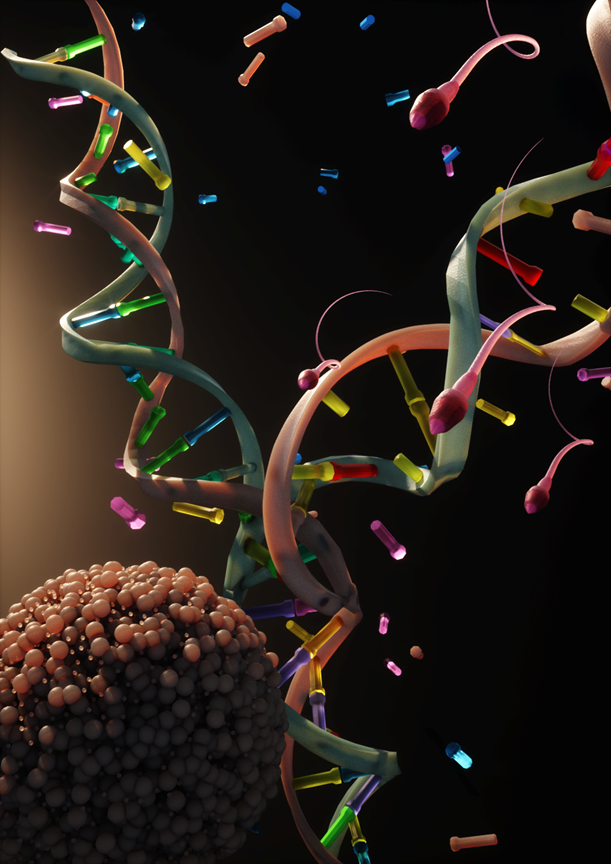 Health & Physiology
Health & Physiology
Mutations in the germline: How the mother repairs the father’s damaged genome
Germline mutations can have a severe impact on genetic diseases, genome evolution and the fate of a species. The vast majority of inheritable mutations are passed on by the paternal genome. We discovered how paternal DNA damage is repaired by maternal repair leading to the inheritance of structural variants.

Mutations that occur in the germline can have long-lasting effects. Genome evolution is driven by germline mutations, but also genetic diseases are caused by inheritable mutations. 80% of new mutations including single nucleotide variants (SNVs), i.e. mutations affecting the change of a single building block of DNA, and the more severe structural variants (SVs), i.e. more severe changes in the structure of the DNA, are generated in the paternal genome that is passed on by the father.
The vulnerability of the paternal genome has been the source of long debates about the consequences of exposure to radiation or other sources of DNA damage on the children. Such debates were held in the context of the nuclear bombings in Hiroshima and Nagasaki, the nuclear accident in Chernobyl, or radiation exposure of nuclear power plant workers. A major limitation in those debates, however, has been the lack of mechanistic understanding of the consequences of DNA damage in the genomes of the paternal germ cells.
However, the zygote uses a highly error-prone repair mechanism, the so-called “theta-mediated endjoining”, short TMEJ. TMEJ is a special DNA repair mechanism that joins the ends rather randomly resulting in structural variants (SVs), within the paternal genome. These SVs give rise to ongoing breaks in the genome, while the zygote develops into an embryo, which then grows into an adult animal. These adult animals that were fathered with damaged sperm DNA then produce a high degree of dead progeny.
On the molecular level, we realized that these animals had a high degree of densely packed DNA structures. Such structures are generated by high levels of so-called linker histones, which are proteins that wrap up the DNA. When we alleviated the density of those histone structures, an error-free repair mechanism could gain access to repair the damage and restore viability.
Original Article:
Wang, S., Meyer, D. H. & Schumacher, B. Inheritance of paternal DNA damage by histone-mediated repair restriction. Nature 613, 365–374 (2023).Next read: The evolution of the new coronavirus: what the past teaches us for a better future by Akira Ohkubo
Edited by:
Christina Elsner , Junior Scientific Editor
We thought you might like
The mutation that allowed our brain to grow
Aug 24, 2017 in Evolution & Behaviour | 4 min read by Reinier ProseeTobacco smoking and other exposures shut off cancer-fighting genes
Aug 31, 2024 in Health & Physiology | 3 min read by Jüri Reimand , Nina AdlerThe 10,000-year evolution of pasta food revealed by its DNA
Oct 18, 2019 in Plant Biology | 3 min read by Caterina Marè , A. M. Mastrangelo , S. WalkowiakHow almonds became sweet
Feb 7, 2020 in Plant Biology | 4 min read by Raquel Sánchez-Pérez , Birger Lindberg MøllerMore from Health & Physiology
Tobacco smoking and other exposures shut off cancer-fighting genes
Aug 31, 2024 in Health & Physiology | 3 min read by Jüri Reimand , Nina AdlerA hidden clock that times cytoplasmic divisions
Aug 30, 2024 in Health & Physiology | 3 min read by Cindy OwWhen two kinases go for a dance
Aug 2, 2024 in Health & Physiology | 4 min read by Ioannis Galdadas , Francesco Luigi Gervasio , Pauline JuyouxAwakening the thymus to cure SARS-CoV-2 infection: a matter of genes
Jul 27, 2024 in Health & Physiology | 3.5 min read by Stefano Marullo , Cheynier RemiKeeping the balance: How epigenetics monitors cancer genes
May 13, 2024 in Health & Physiology | 4 min read by Zach Gray , Madison Honer , Johnathan WhetstineEditor's picks
Trending now
Popular topics


